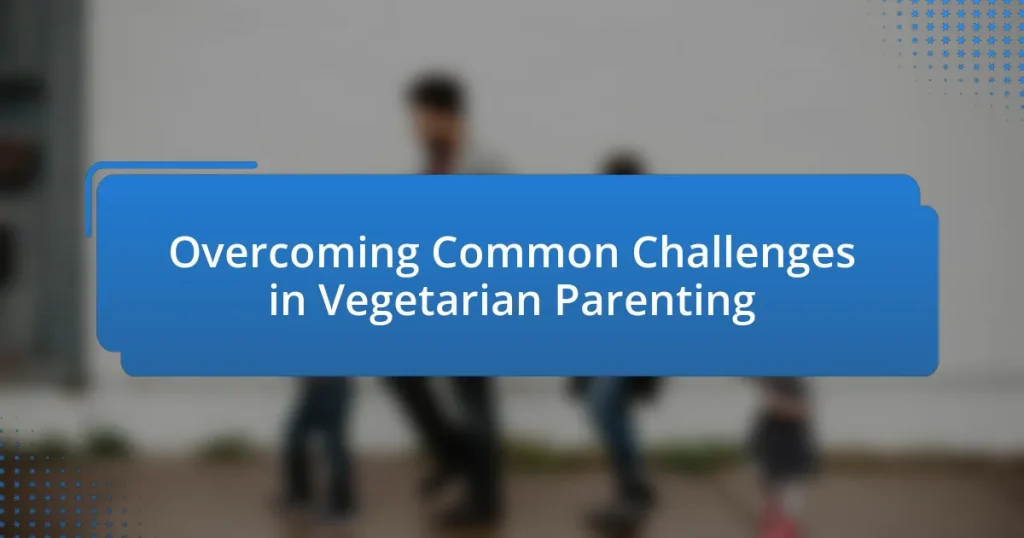The article focuses on overcoming common challenges in vegetarian parenting, highlighting key issues such as nutritional concerns, social pressures, and misconceptions about vegetarian diets. It emphasizes the importance of ensuring children receive adequate nutrients like protein, iron, calcium, and vitamin B12, while also addressing the social dynamics that vegetarian families face in various settings. Strategies for effective meal planning, involving children in food preparation, and fostering open communication about dietary choices are discussed, along with the long-term health benefits and ethical values instilled through vegetarian parenting. The article provides practical tips and resources to support vegetarian families in navigating these challenges successfully.

What are the common challenges faced in vegetarian parenting?
Common challenges faced in vegetarian parenting include ensuring adequate nutrition, managing social situations, and addressing misconceptions about vegetarian diets. Parents must navigate the complexities of providing balanced meals that meet their children’s nutritional needs, particularly for protein, iron, calcium, and vitamin B12, which are often less abundant in vegetarian diets. Social situations, such as birthday parties or school lunches, can pose difficulties when vegetarian options are limited or when children face peer pressure regarding food choices. Additionally, misconceptions about vegetarianism can lead to criticism or lack of understanding from family members and friends, making it essential for parents to advocate for their dietary choices and educate others about the benefits of a vegetarian lifestyle.
How do nutritional concerns impact vegetarian parenting?
Nutritional concerns significantly impact vegetarian parenting by necessitating careful planning to ensure children receive adequate nutrients. Parents must focus on providing a balanced diet that includes sufficient protein, iron, calcium, vitamin B12, and omega-3 fatty acids, which are often less abundant in vegetarian diets. For instance, a study published in the Journal of the American Dietetic Association indicates that vegetarian children may be at risk for deficiencies in these nutrients if not properly managed. This requires parents to be knowledgeable about plant-based sources of these nutrients, such as legumes, fortified foods, and leafy greens, to support their children’s growth and development effectively.
What essential nutrients should vegetarian parents focus on?
Vegetarian parents should focus on essential nutrients such as protein, iron, calcium, vitamin B12, vitamin D, omega-3 fatty acids, and zinc. These nutrients are crucial for the growth and development of children.
Protein can be obtained from legumes, nuts, seeds, and whole grains, which are vital for muscle development and overall health. Iron is important for oxygen transport in the blood and can be sourced from lentils, chickpeas, and fortified cereals; pairing these with vitamin C-rich foods enhances absorption. Calcium is necessary for bone health and can be found in fortified plant milks, tofu, and leafy greens.
Vitamin B12, primarily found in animal products, is essential for nerve function and can be supplemented or obtained from fortified foods. Vitamin D supports calcium absorption and can be synthesized through sunlight exposure or taken as a supplement. Omega-3 fatty acids, important for brain health, can be sourced from flaxseeds, chia seeds, and walnuts. Lastly, zinc supports immune function and can be found in beans, nuts, and whole grains.
Focusing on these nutrients ensures that vegetarian children receive a balanced diet that supports their growth and development.
How can parents ensure their children receive a balanced diet?
Parents can ensure their children receive a balanced diet by incorporating a variety of foods from all food groups, including fruits, vegetables, whole grains, proteins, and dairy. This approach helps meet the nutritional needs essential for growth and development. Research indicates that a diverse diet can provide necessary vitamins and minerals; for example, the Dietary Guidelines for Americans recommend that children consume a range of colorful fruits and vegetables to ensure adequate intake of nutrients like vitamin C and fiber. Additionally, parents can consult with a pediatrician or a registered dietitian to create meal plans that cater to their child’s specific dietary requirements, ensuring that all essential nutrients are included, particularly in vegetarian diets where protein sources such as legumes, nuts, and seeds are crucial.
What social challenges do vegetarian parents encounter?
Vegetarian parents encounter social challenges such as stigma, lack of understanding, and limited food options in social settings. These parents often face criticism or judgment from peers and family members who may not understand their dietary choices, leading to feelings of isolation. Additionally, when attending gatherings or events, vegetarian parents frequently struggle to find suitable food options, which can create discomfort and social awkwardness. Research indicates that dietary preferences can significantly impact social interactions, as highlighted in studies examining the social dynamics of dietary choices.
How can parents handle peer pressure regarding food choices?
Parents can handle peer pressure regarding food choices by fostering open communication and encouraging critical thinking about food. By discussing the reasons behind their dietary choices, parents can help children understand the values of vegetarianism, such as health benefits and environmental impact. Research indicates that children who engage in discussions about food choices with their parents are more likely to resist negative peer influences (Harris et al., 2013, Journal of Nutrition Education and Behavior). Additionally, parents can model positive behaviors by making nutritious food choices themselves and providing a variety of appealing vegetarian options at home. This approach not only reinforces the family’s dietary values but also equips children with the confidence to make informed choices in social situations.
What strategies can help in dealing with family and friends’ opinions?
To effectively deal with family and friends’ opinions, one strategy is to establish clear communication about personal choices. This involves articulating the reasons behind vegetarian parenting, such as health benefits, ethical considerations, or environmental concerns. Research indicates that open dialogue can reduce misunderstandings and foster respect for differing viewpoints. For instance, a study published in the Journal of Family Communication highlights that families who engage in constructive conversations about dietary choices experience less conflict and greater acceptance. Another strategy is to set boundaries by politely declining unsolicited advice, which helps maintain personal autonomy while minimizing stress. Additionally, seeking support from like-minded individuals or communities can provide reassurance and validation, reinforcing the decision to pursue vegetarian parenting despite external opinions.
How do children’s preferences affect vegetarian parenting?
Children’s preferences significantly influence vegetarian parenting by determining the acceptance and adherence to a vegetarian diet within the family. When children express a strong preference for certain foods, parents may feel pressured to accommodate these tastes, which can lead to compromises in dietary choices. For instance, research indicates that children are more likely to accept vegetarian meals if they are involved in the meal planning process, highlighting the importance of their preferences in shaping family dietary habits. Additionally, studies show that children who are exposed to a variety of vegetarian options from an early age are more likely to develop a preference for plant-based foods, thereby supporting vegetarian parenting practices.
What are effective ways to introduce vegetarian foods to children?
Effective ways to introduce vegetarian foods to children include incorporating familiar flavors, using fun presentations, and involving children in meal preparation. Familiar flavors can be achieved by creating vegetarian versions of their favorite dishes, such as using plant-based proteins in tacos or pasta. Fun presentations, like arranging vegetables into colorful shapes or using dips, can make the food more appealing. Involving children in meal preparation encourages them to try new foods, as studies show that children are more likely to eat what they help create. These strategies can help ease the transition to a vegetarian diet while ensuring children receive balanced nutrition.
How can parents encourage children to try new vegetarian dishes?
Parents can encourage children to try new vegetarian dishes by involving them in the cooking process. Engaging children in meal preparation fosters curiosity and ownership over their food choices, making them more likely to taste new dishes. Research indicates that children who participate in cooking are more open to trying new foods, as they develop a sense of accomplishment and interest in the meals they help create. Additionally, presenting vegetarian dishes in a fun and appealing way, such as using colorful ingredients or creative plating, can enhance their willingness to try these foods.

How can parents overcome these challenges?
Parents can overcome challenges in vegetarian parenting by educating themselves about balanced nutrition and meal planning. Understanding essential nutrients such as protein, iron, calcium, and vitamin B12 is crucial, as these are often less abundant in vegetarian diets. Research indicates that a well-planned vegetarian diet can meet all nutritional needs for children, as supported by the American Dietetic Association, which states that appropriately planned vegetarian diets are healthful and nutritionally adequate. Additionally, parents can involve children in meal preparation to foster interest in diverse foods and ensure they are more willing to try new vegetarian options.
What resources are available for vegetarian parents?
Vegetarian parents have access to various resources that support their dietary choices and parenting needs. These resources include cookbooks specifically designed for vegetarian families, such as “The Vegetarian Family Cookbook” by Susan McQuillan, which offers recipes and meal planning tips. Online platforms like the Vegetarian Resource Group provide educational materials, nutritional guidelines, and community support for vegetarian families. Additionally, social media groups and forums allow vegetarian parents to connect, share experiences, and exchange recipes. Research indicates that children raised on vegetarian diets can meet their nutritional needs when properly planned, as outlined by the American Dietetic Association.
How can cookbooks and online platforms assist in meal planning?
Cookbooks and online platforms assist in meal planning by providing structured recipes, nutritional information, and meal ideas tailored to specific dietary needs. Cookbooks offer a curated selection of vegetarian recipes that can simplify the planning process, ensuring balanced meals that meet nutritional requirements. Online platforms enhance this by allowing users to search for recipes based on ingredients, dietary restrictions, and meal types, making it easier to create diverse meal plans. For instance, websites like Yummly and Allrecipes provide user-generated content and reviews, which can help parents select meals that are both appealing and nutritious for their children.
What role do community groups play in supporting vegetarian families?
Community groups play a crucial role in supporting vegetarian families by providing resources, social connections, and advocacy. These groups often organize events, workshops, and potlucks that allow vegetarian families to share recipes, cooking tips, and nutritional information, fostering a sense of community and belonging. Additionally, community groups may offer educational programs that address the challenges of vegetarian parenting, such as ensuring balanced nutrition for children. Research indicates that social support networks significantly enhance dietary adherence and satisfaction among families, highlighting the importance of community engagement in promoting vegetarian lifestyles.
What practical tips can help in managing dietary restrictions?
To effectively manage dietary restrictions, individuals should plan meals in advance, ensuring they include a variety of foods that meet their dietary needs. Meal planning helps in avoiding last-minute decisions that may lead to non-compliance with dietary restrictions. Research indicates that families who engage in meal planning are more likely to adhere to their dietary guidelines, as it promotes healthier eating habits and reduces reliance on convenience foods. Additionally, keeping a well-stocked pantry with compliant ingredients allows for quick meal preparation, further supporting adherence to dietary restrictions.
How can parents create a flexible meal plan that accommodates everyone?
Parents can create a flexible meal plan that accommodates everyone by incorporating a variety of ingredients and meal options that cater to different dietary preferences and restrictions. This approach involves planning meals that include vegetarian, vegan, and omnivorous choices, ensuring that all family members have satisfying options. For instance, parents can prepare a base dish, such as a grain bowl, and allow family members to customize their meals with various toppings like roasted vegetables, proteins, and sauces. Research indicates that involving children in meal planning increases their willingness to try new foods, making it easier to accommodate diverse tastes. By regularly rotating recipes and seeking input from family members, parents can maintain engagement and satisfaction with the meal plan.
What are some easy vegetarian recipes that kids will love?
Easy vegetarian recipes that kids will love include vegetable quesadillas, pasta primavera, and homemade veggie burgers. Vegetable quesadillas can be made by filling tortillas with cheese and assorted vegetables like bell peppers and spinach, then grilling until crispy. Pasta primavera involves cooking pasta and tossing it with a variety of colorful vegetables such as carrots, peas, and zucchini, often finished with a light olive oil or tomato sauce. Homemade veggie burgers can be created using black beans, oats, and spices, formed into patties and grilled or baked. These recipes are not only simple to prepare but also appealing to children due to their vibrant colors and familiar flavors.

What are the long-term benefits of vegetarian parenting?
Vegetarian parenting offers long-term benefits such as improved health outcomes, environmental sustainability, and ethical awareness in children. Research indicates that children raised on vegetarian diets tend to have lower risks of obesity, heart disease, and certain cancers due to higher intakes of fruits, vegetables, and whole grains. A study published in the Journal of the American Dietetic Association found that vegetarian children often have better cholesterol levels and blood pressure compared to their meat-eating peers. Additionally, vegetarian parenting fosters a sense of environmental responsibility, as plant-based diets are associated with lower carbon footprints and reduced resource consumption. This awareness can lead to lifelong habits that prioritize sustainability. Lastly, instilling ethical considerations regarding animal welfare can cultivate compassion and empathy in children, shaping their values and decision-making as they grow.
How does vegetarianism impact children’s health in the long run?
Vegetarianism can positively impact children’s health in the long run by promoting a diet rich in fruits, vegetables, whole grains, and legumes, which are associated with lower risks of obesity, heart disease, and certain cancers. Research published in the Journal of the American Dietetic Association indicates that well-planned vegetarian diets can provide all necessary nutrients for growth and development, including protein, iron, calcium, and vitamins B12 and D. Furthermore, a study by the American Academy of Pediatrics highlights that children following vegetarian diets often have healthier cholesterol levels and blood pressure compared to their meat-eating peers.
What studies support the health benefits of a vegetarian diet for children?
Research indicates that a vegetarian diet can provide significant health benefits for children. A study published in the journal “Nutrients” in 2019 by Sabaté and Sazawal found that vegetarian children tend to have lower body mass index (BMI) and reduced risk of obesity compared to their non-vegetarian peers. Additionally, a systematic review in “Pediatrics” by Craig and Mangels in 2009 highlighted that well-planned vegetarian diets can meet the nutritional needs of children and are associated with lower cholesterol levels and improved heart health. These studies collectively support the notion that a vegetarian diet can be beneficial for children’s overall health and development.
How can a vegetarian diet influence children’s eating habits as adults?
A vegetarian diet can significantly influence children’s eating habits as adults by instilling a preference for plant-based foods and promoting healthier eating patterns. Research indicates that children raised on vegetarian diets are more likely to continue consuming fruits, vegetables, and whole grains into adulthood, leading to lower risks of chronic diseases such as obesity and heart disease. A study published in the Journal of Nutrition found that individuals who followed vegetarian diets during childhood exhibited higher intakes of dietary fiber and lower intakes of saturated fats as adults, reinforcing the long-term benefits of early dietary choices.
What values can vegetarian parenting instill in children?
Vegetarian parenting can instill values of compassion, health consciousness, and environmental awareness in children. By choosing a vegetarian lifestyle, parents model compassion towards animals, teaching children to empathize with living beings and understand the ethical implications of food choices. Research indicates that children raised in vegetarian households often develop a greater awareness of health and nutrition, as they learn to appreciate plant-based foods and their benefits, which can lead to healthier eating habits throughout life. Additionally, vegetarian parenting fosters environmental consciousness, as children learn about the ecological impact of meat production and the benefits of sustainable eating practices, contributing to a sense of responsibility towards the planet.
How does vegetarianism promote environmental awareness in children?
Vegetarianism promotes environmental awareness in children by instilling an understanding of the ecological impact of food choices. When children adopt a vegetarian diet, they learn about the benefits of reducing meat consumption, which is linked to lower greenhouse gas emissions, decreased deforestation, and less water usage. Research indicates that livestock production is responsible for approximately 14.5% of global greenhouse gas emissions, highlighting the environmental significance of dietary choices. By engaging in vegetarianism, children become more conscious of sustainability issues, fostering a sense of responsibility towards the planet and encouraging them to make informed decisions about their food consumption.
What ethical considerations can be discussed with children regarding food choices?
Ethical considerations that can be discussed with children regarding food choices include animal welfare, environmental impact, and health implications. Children can learn about how food production affects animals, such as the conditions in factory farming, which often leads to suffering and exploitation. Additionally, discussions can focus on the environmental consequences of food choices, such as the carbon footprint of meat production compared to plant-based diets, highlighting that livestock farming contributes significantly to greenhouse gas emissions. Furthermore, children can explore the health benefits of vegetarian diets, supported by studies indicating that plant-based diets can reduce the risk of chronic diseases. These discussions can help children understand the broader implications of their food choices and encourage them to make informed decisions.
What are some best practices for successful vegetarian parenting?
Successful vegetarian parenting involves ensuring a balanced and nutritious diet for children while fostering a positive attitude towards plant-based eating. Parents should focus on incorporating a variety of fruits, vegetables, whole grains, legumes, nuts, and seeds to meet essential nutrient needs, including protein, iron, calcium, and vitamin B12. Research indicates that children on vegetarian diets can thrive when these nutrients are adequately provided, as highlighted in the American Dietetic Association’s position paper, which states that well-planned vegetarian diets are healthful and nutritionally adequate for all stages of life. Additionally, involving children in meal planning and preparation can enhance their interest in vegetarian foods and promote healthy eating habits.
How can parents maintain a positive attitude towards food choices?
Parents can maintain a positive attitude towards food choices by focusing on the benefits of healthy eating and modeling enthusiasm for diverse foods. Encouraging children to explore various vegetarian options fosters curiosity and openness, which can lead to a more positive relationship with food. Research indicates that children are more likely to adopt healthy eating habits when they observe their parents enjoying a variety of foods, as demonstrated in a study published in the Journal of Nutrition Education and Behavior, which found that parental modeling significantly influences children’s dietary preferences.
What are effective ways to involve children in meal preparation?
Effective ways to involve children in meal preparation include assigning age-appropriate tasks, such as washing vegetables, measuring ingredients, or stirring mixtures. Research indicates that children who participate in cooking are more likely to try new foods and develop healthier eating habits. A study published in the Journal of Nutrition Education and Behavior found that children who helped prepare meals were more inclined to consume fruits and vegetables, reinforcing the importance of hands-on involvement in fostering positive dietary choices.


